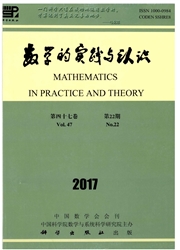

 中文摘要:
中文摘要:
[目的/意义]随着互联网的普及,使得突发事件造成的影响不再局限于发生地,会通过网络扩散和传播,形成更广泛的影响,研究影响突发事件风险决策的关键因素,为突发事件应急管理提供合理化建议。[方法/过程]以洪涝灾害为研究背景,结合E—prime和眼动追踪技术,采用2(感知社会距离:远、近)×2(框架:获益、损失)的组间设计,通过分析结果数据和眼动数据探讨突发事件背景下感知社会距离对风险决策框架效应的影响。[结果/结论]无论获益框架还是损失框架,感知社会距离近组比远组更倾向于风险寻求;在获益框架下,感知社会距离近组比远组表现出更强烈的风险寻求倾向,且付出更多的认知努力,出现了风险偏好逆转现象;无论感知社会距离远近,损失框架比获益框架均需付出更多的认知努力,当感知社会距离越远时,框架效应越明显。研究结果表明,突发事件背景下感知社会距离对风险决策框架效应的影响显著,为提高突发事件的应对效果提供了理论基础。
 英文摘要:
英文摘要:
[Purpose/Significance] With the popularity of the Interact, the influence of an emergency is no longer confined to the local area, and it may spread via the Intemet and has a more significant impact. In this paper, we explore the key factors that affect the risk deci- sion making to provide reasonable suggestions for emergency management. [ Method/Process] Taking flood disaster as the research back- ground, with a 2 (far perceived social distance, close perceived social distance) × 2 (gain frame, loss frame) experimental design, com- bining with E-prime and eye-tracking technology, this paper discusses the influence of perceived social distance on framing effect of risk decision in the context of emergencies by analyzing the result data and eye movement data. [Result/Conclusion] Regardless of the frame- work of gain or loss, perceived close social distance subjects are inclined to risk-seeking compared to perceived far social distance sub- jeers; Under the gain framework, perceived close social distance subjectS tend to risk-seeking than the far group and pay more cognitive effort, and there was a reversal of risk preference; Regardless of perceived social distance far or close , the loss framework subjects pay more cognitive effort than the gain, and the farther the distance is, the more obvious the framing effect is. The results show that the perceived social distance has a significant impact on the framing effect of risk decision in the context of emergencies, providing a theoretical basis for improving the response of emergency.
 同期刊论文项目
同期刊论文项目
 同项目期刊论文
同项目期刊论文
 No association of neurotensin receptor 1 (NTR1) gene polymorphisms with either trait or state anxiet
No association of neurotensin receptor 1 (NTR1) gene polymorphisms with either trait or state anxiet Competition Mechanism of False Information in Public Crisis based on Improved Lotka-Volterra competi
Competition Mechanism of False Information in Public Crisis based on Improved Lotka-Volterra competi Effect of information, uncertainty and parameter variability on pro?ts in a queue with various prici
Effect of information, uncertainty and parameter variability on pro?ts in a queue with various prici Evaluation of Collaborative Supply Chain Stability Based on the Optimal Combination Weighting Method
Evaluation of Collaborative Supply Chain Stability Based on the Optimal Combination Weighting Method 期刊信息
期刊信息
